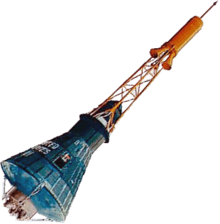Little Joe 5A
 Little Joe 5A being prepared for launch, Wallops Island | |||||
| Mission type | Abort test | ||||
|---|---|---|---|---|---|
| Operator | NASA | ||||
| Mission duration | 5 minutes, 25 seconds | ||||
| Distance travelled | 29 kilometres (18 mi) | ||||
| Apogee | 12.4 kilometres (7.7 mi) | ||||
| Spacecraft properties | |||||
| Spacecraft | Mercury No.14 | ||||
| Manufacturer | McDonnell Aircraft | ||||
| Launch mass | 1,141 kilograms (2,515 lb) | ||||
| Start of mission | |||||
| Launch date | March 18, 1961, 16:49 UTC | ||||
| Rocket | Little Joe | ||||
| Launch site | Wallops LA-1 | ||||
| End of mission | |||||
| Landing date | March 18, 1961, 16:54 UTC | ||||

| |||||
Little Joe 5A was an unmanned Launch Escape System test of the Mercury spacecraft, conducted as part of the U.S. Mercury program. It was an attempted re-test of the failed Little Joe 5 flight. The mission used production Mercury spacecraft #14 atop a Little Joe booster rocket. The mission was launched March 18, 1961, from Wallops Island, Virginia. The LJ-5 failure sequence was repeated when capsule escape rocket again ignited prematurely with the capsule remaining attached to the booster. In this flight however, a ground command was sent to separate the capsule from the booster and escape tower. This allowed the main and reserve parachutes to deploy and the capsule was recovered with only minor damage. It would be used again on the subsequent Little Joe 5B mission, in a third attempt to achieve mission objectives. The Little Joe 5A flew to an apogee of 7.7 miles (12 km) and a range of 18 miles (29 km). The mission lasted 5 minutes 25 seconds. Maximum speed was 1,783 miles per hour (2,869 km/h) and acceleration was 8 G (78 m/s²).[1]
Mercury spacecraft # 14 used in the Little Joe 5A mission, is currently displayed at the Virginia Air and Space Center, Hampton, Virginia.[2]
References
![]() This article incorporates public domain material from websites or documents of the National Aeronautics and Space Administration.
This article incorporates public domain material from websites or documents of the National Aeronautics and Space Administration.
- ↑ "LJ-5A (14)". NASA Public Affairs Office.
- ↑ Little Joe 5A in A Field Guide to American Spacecraft
